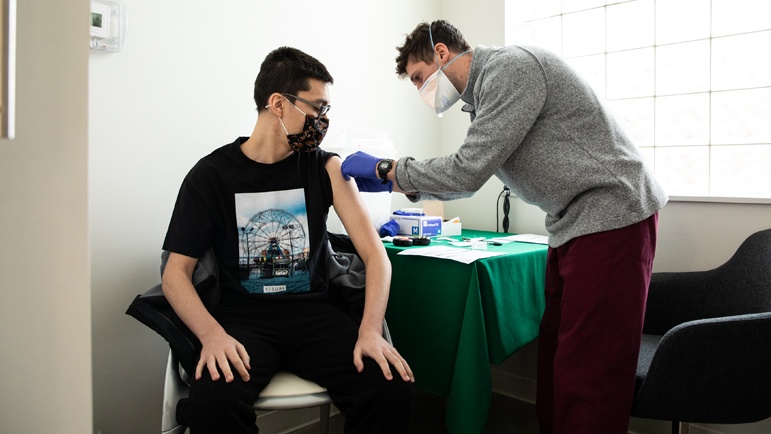Providing health care resources for its underserved neighbors is at the core of the Rush University experience. When the latest COVID-19 surge arrived in Chicago, the Rush community came together to find creative solutions to help with staffing shortages and increase outreach efforts in Chicago neighborhoods hard hit by the pandemic.
“There was a need in the community to increase both testing efforts and vaccinations efforts in communities around Chicago,” says Adam Beer, a student at Rush Medical College. “My classmates and I worked with some of our faculty and deans to start an elective for fourth-year medical students at Rush to send us to sites around the city and at Rush itself to help the workforce and get these (testing and vaccination efforts) moving forward.”
The elective, Service and Leadership in a Health Care Crisis, was created as a response to the COVID-19 omicron surge to provide service and outreach to the Rush community. Open to fourth-year Rush Medical College students, the two- or four-week elective allows participants to work collaboratively with Rush faculty to evaluate and triage suspected COVID-19 patients in the Rush University Medical Center emergency department, help administer COVID-19 testing, conduct telephone triage and join in underserved community outreach.
Volunteer sites have included community programs with a long-standing relationship with Rush as well as local partners, such as Enlace, an organization in Chicago’s Little Village neighborhood focused on confronting systemic inequities and barriers to economic and social access. Rush hosts a weekly COVID-19 vaccination clinic at Enlace with Rush staff and Rush University student volunteers.
As part of the new elective, fourth-year student Amanda Narkis volunteered at Enlace. Narkis says providing COVID-19 vaccines to underserved communities has been a very rewarding experience.
“The most powerful thing for me has to be seeing them get (the vaccine),” she says. “Sometimes there are so many barriers — whether it is economic, social or just fear — but being able to give them affirmations and share this moment. … I’m very excited for them.”
“All of the places we go to have treated us like home, like family,” says Keisha Robinson, a medical assistant at Rush University Medical Center who has spent the last seven months providing COVID-19-related health services throughout Chicago. “The community response has been really great.”

